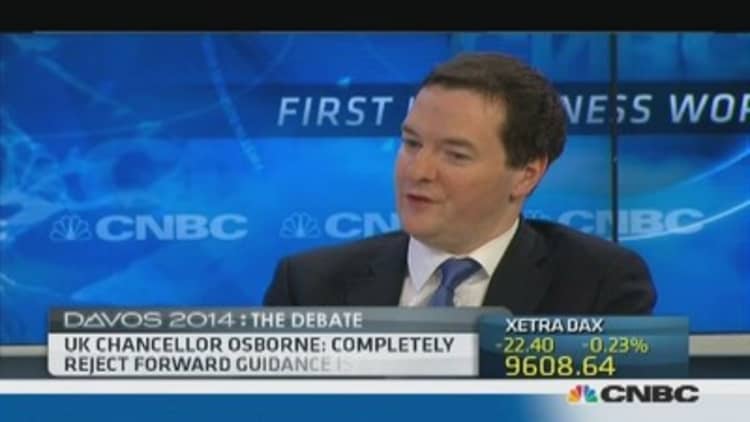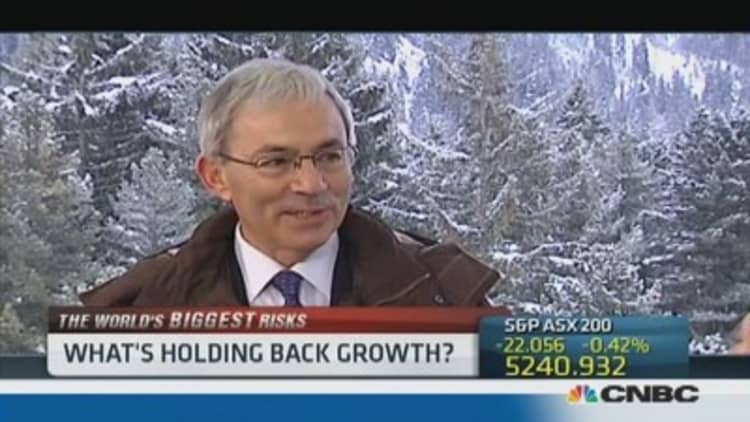Bank of England (BoE) Governor Mark Carney reiterated on Friday that while the bank's forward guidance policy could evolve, it was not in any hurry to hike rates, following widespread speculation that it could amend or even abandon its policy as the U.K. economy shows signs of improvement.
"The Bank's assessment of how to evolve guidance to changing circumstances will begin in our February Inflation Report," Carney told business leaders in at the World Economic Forum in Davos, Switzerland, according to a pre-released copy of his speech.
"The monetary policy committee (MPC) will consider a range of options to update our guidance, recognising both what we have learned about the behaviour of aggregate supply in the economy as well as the more benign inflation outlook."
Sterling fell to a session low of $1.6563 after Carney's comments, from $1.6614 beforehand.
Carney's remarks come as speculation mounted that the policy of sticking interest rates to the U.K's unemployment figures might be unraveling. Data this week showed that the U.K. unemployment rate in December fell to within a whisker of the bank's target of 7 percent at which it had previously suggested it would consider raising rates.
Once again, however, Carney said that the unemployment target was not a "trigger" for raising rates. "Even though unemployment is falling faster than expected, the recovery has some way to run before it would be appropriate to consider moving away from the emergency setting of monetary policy."
"A few quarters of above-trend growth driven by household spending represent a good start, but they aren't sufficient. It will take sustained growth, more balanced demand and a recovery in the supply side for advanced economies to break free into a more normal universe," his speech noted.
"In the U.K., the question is whether labour productivity will reverse any of its poor performance," Carney said, adding that the limitations of central banks included not knowing how much capacity was destroyed following the crisis, why productivity growth had slowed or indeed when it would pick up.
"By this point, buffeted by gloom and uncertainty, you may be considering joining the bankers in pushing me off the mountainside," he said, alluding to criticism that he has not given clear enough guidance as to the central bank's policy going forward as U.K. macroeconomic data continues to improve.

Earlier on Friday, the U.K. finance minister George Osborne defended the Bank of England's forward guidance policy. "I completely reject that forward guidance is a failure," he told a panel on monetary policy in Davos hosted by CNBC Friday.
(Follow CNBC's Davos debate on the future of monetary policy on our live blog)
On Thursday, an independent member of the bank's interest rate-setting Monetary Policy Committee (MPC), Martin Weale, dismissed suggestions that the bank could now amend its unemployment rate target, telling a local U.K. newspaper that any new threshold could be quickly taken over by events. He added there was scope for rates to remain at their current level for a while yet.
(Read more: Mark Carney won't be 'railroaded' on rates: BAE's Carr)
Despite attempts to reassure the markets, however, media outlets such as the Financial Times reported that Carney's policy of forward guidance -- designed to calm markets that specific inflation and job targets had to be reached before the bank would even consider a rate hike --
Analysts told CNBC that both the media and markets shouldn't jump to conclusions, however.
"Some have suggested that the Governor has decided to ignore this particular [unemployment] indicator, but given we haven't hit the 7 percent level yet, and may not do so for a couple of months yet. It seems premature to consign it the scrap heap just yet, given the threshold was always a "staging post" and not a trigger," Michael Hewson, senior market analysts at CMC Markets said on Friday.
"Last night's comments shouldn't really have been a surprise," Hewson added, particularly "given comments he made in November last year when he stated 'one could imagine a scenario where the unemployment threshold is reached and that the best policy for the MPC at that period of time is to keep rates at current levels.'"
(Read more: Carney unveils Fed-style forward guidance)
Markets would now be looking for some form of rate rise by 2015, Hewson said, "but they pretty much knew that when the 2016 guidance was announced" and would be looking towards February's inflation report when the Bank publishes its latest forecasts and guidance thresholds.

Christopher Pissarides, professor of Economics at the London School of Economics, told CNBC at the World Economic Forum in Davos, that Mark Carney should avoid making his forward guidance policy into a "straitjacket."
(Read more: UK inflation hits BoE target; first time in 4 years)
"I would not be giving very strict rules like 'if this goes there I would do that' -- [the BoE] should be a little bit more vague," Pissarides said on Friday, advocating a "forward guidance lite" policy where guidance was vague.
"It's forward guidance but it's not a straitjacket," the former Nobel Prize winner for economics said, adding that Carney should adopt an approach in which he says "I'm looking at all the information and I'm saying what I'm looking at –which is important for transparency -- but I'm not putting myself into a straitjacket and saying, 'this is what I'm going to do and no more and no less."
- By CNBC's Holly Ellyatt, follow her on Twitter @HollyEllyatt


